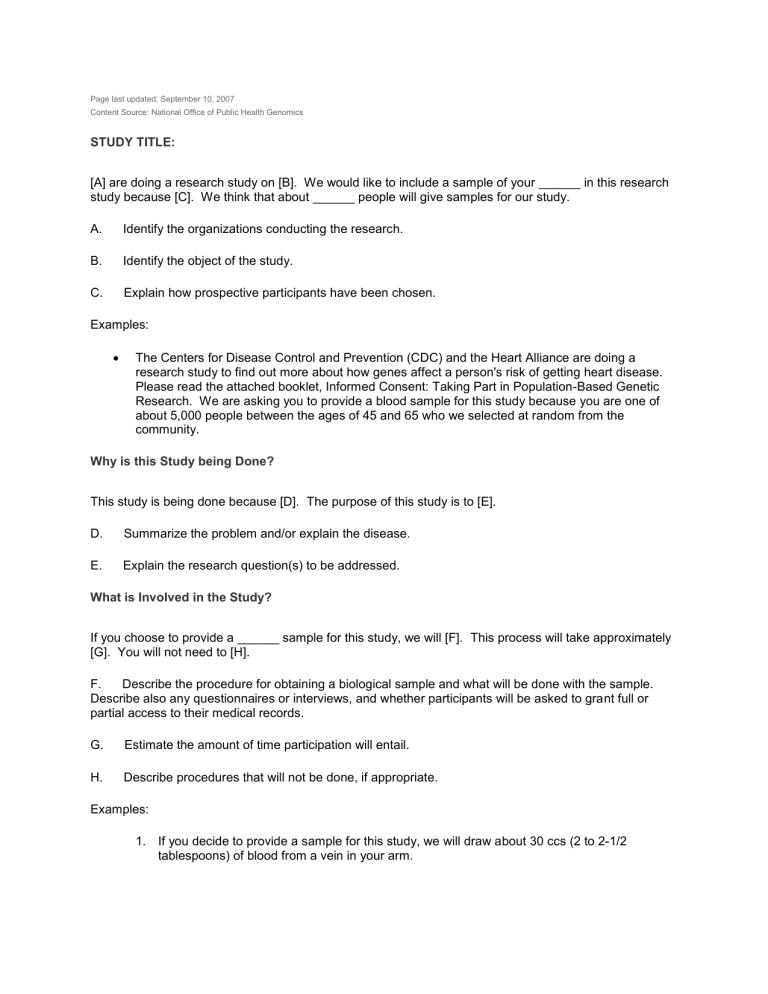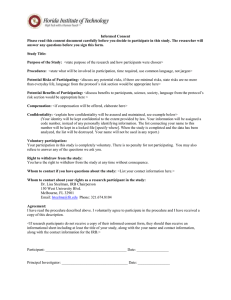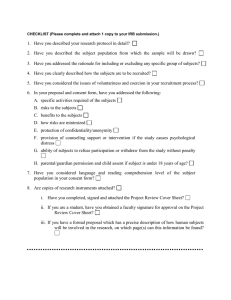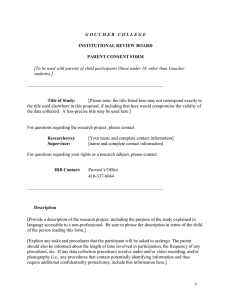Document 15343871

Page last updated: September 10, 2007
Content Source: National Office of Public Health Genomics
STUDY TITLE:
[A] are doing a research study on [B]. We would like to include a sample of your ______ in this research study because [C]. We think that about ______ people will give samples for our study.
A. Identify the organizations conducting the research.
B. Identify the object of the study.
C. Explain how prospective participants have been chosen.
Examples:
The Centers for Disease Control and Prevention (CDC) and the Heart Alliance are doing a research study to find out more about how genes affect a person's risk of getting heart disease.
Please read the attached booklet, Informed Consent: Taking Part in Population-Based Genetic
Research. We are asking you to provide a blood sample for this study because you are one of about 5,000 people between the ages of 45 and 65 who we selected at random from the community.
Why is this Study being Done?
This study is being done because [D]. The purpose of this study is to [E].
D. Summarize the problem and/or explain the disease.
E. Explain the research question(s) to be addressed.
What is Involved in the Study?
If you choose to provide a ______ sample for this study, we will [F]. This process will take approximately
[G]. You will not need to [H].
F. Describe the procedure for obtaining a biological sample and what will be done with the sample.
Describe also any questionnaires or interviews, and whether participants will be asked to grant full or partial access to their medical records.
G. Estimate the amount of time participation will entail.
H. Describe procedures that will not be done, if appropriate.
Examples:
1. If you decide to provide a sample for this study, we will draw about 30 ccs (2 to 2-1/2 tablespoons) of blood from a vein in your arm.
We will also ask you to fill out a survey about your health, diet, and exercise, and your use of tobacco, alcohol, and medicines. It is all right to skip any question you don't want to answer.
We will need less than 5 minutes to take the blood sample. The survey will take about 30 minutes. There will be no medicines to take and no experimental treatments to undergo in this study.
2. If you choose to be in this study, we will collect a sample of your cells by brushing the inside of your cheek with a cotton swab.
We will also need to check with your doctors to confirm whether you have had any of the heart diseases we are studying. To do this, we will ask you to sign a form to let your doctor give us a copy of your medical record.
Nothing else is required. We will compare the results with tests on other people who have heart disease and on people who do not have heart disease. The only genetic testing performed on your cell sample will be for conditions associated with heart disease.
How will Information about me be Kept Private?
Once we take your ______ sample, we will assign it a code number. We will separate your name and any other information that points to you from your sample. We will keep files that link your name to the code number [I]. [J]. No one who reads or hears a report about this study will be able to identify you because, before any facts are given out, we combine your facts with those of other people in this study.
I. Describe security measures.
J. Describe the extent to which confidentiality of records identifying the participant will be maintained.
Example: Once we take your blood sample, we will assign it a code number. We will separate your name and any other information that points to you from your sample. We will keep files that link your name to the code number in a locked cabinet. Only the study staff will be allowed to look at these files.
[Add one of the following:]
For legally unprotected research: We will keep private both the test results and the information you tell us in the survey. We will only release study information if ordered to by a court of law.
Your name or other facts that might point to you will not appear when we present this study or publish its results.
When a Certificate of Confidentiality has been obtained: Records that identify you in this study are strictly private. No one other than study staff can ever look at them unless you agree to it.
This is because the study has been granted a Certificate of Confidentiality under a federal law
(Section 301(d) of the Public Health Service Act). This means that the records of this study may not be disclosed, even under federal, state, or local court order, without your OK. No one who reads or hears a report about this study will be able to identify you because, before any facts are given out, we combine your facts with those of other people in this study.
What are the Risks of the Study?
The physical risks to you for providing a ______ sample for this study are [K]. [L]. [M].
K. Describe relevant physical risks.
L. Describe the informational risks based on the types of information expected and the identifiability of the sample.
M. Describe potential groups harms.
Example: (K) The risks of drawing blood include brief pain, slight bruising, and rarely, infection where the needle went in. We take every precaution to prevent infection. Some people feel dizzy when they have blood drawn, but this goes away when the person lies down.
(L) The kind of information we will look for in this study is not likely to tell you anything specific about your personal health. To protect your information, we will not keep your name and address with the sample, only a code number. Files that link your name to the code number will be kept in a locked cabinet and only the study staff will be allowed to look at them. Although no one can absolutely guarantee confidentiality, using a code number greatly reduces the chance that someone other than the study staff will ever be able to link your name to your sample or to your test results.
(M) Although your name will not be with the sample, it will have other facts about you such as your race, ethnicity, and sex. These facts are important because they will help us learn if the factors that cause heart disease to occur or get worse are the same or different in men and women, and in people of different racial or ethnic backgrounds. Thus, it is possible that study findings could one day help people of the same race, ethnicity, or sex as you. However, it is also possible through these kinds of studies that genetic traits might come to be associated with your group. In some cases, this could reinforce harmful stereotypes.
Are there Benefits to Taking Part in the Study?
You will not get any direct benefit for giving a ______ sample for this study. The major benefit of the study is [N].
N. Insert the object of the study.
Examples:
You will get no direct benefit from being part of this study. But the information and results from these kinds of studies may help prevent and treat heart disease in the future.
Are any Costs or Payments Involved?
It does not cost you anything to provide a ______ sample for this study and you will not be charged for any research tests. [O]. In the unlikely event that you are physically hurt during the process of providing a ______ sample, [P].
The aim of our research is to improve the public health. [Q].
O. Explain whether participants will be reimbursed for things such as time, travel, and inconvenience.
P. Explain what compensation or medical treatmen t is available if injury occurs: BU’s policy on Human
Subjects Physical Injury: If you are injured as a result of participating in this study y ou and your insurance carrier are assuming full financial responsibility for any injury that you may suffer as a result of participating in this study. No other form of compensation is being offered but that doesn’t mean you are giving up any of your legal rights Look up medical costs.
Examples:
It does not cost you anything to provide a blood sample for this study and you will not be charged for any research tests. You will not be paid for participation in this study. In the unlikely event that you are injured while giving a blood sample, we will give you first aid and direct you to proper health treatment. We have not set aside funds to pay for this care or to compensate you if a mishap occurs.
The aim of our research is to improve the public health. Your blood will never be used to develop a process or invention that will be sold or patented.
There are no dollar costs to you for being in this study. We will give you $25 to reimburse you for your time and effort. If you are physically hurt because of this research project, we will help you to get medical care through your usual doctor. You or your health insurer will need to pay for any such care that you get.
The aim of our research is to improve the public health. Sometimes, such research may result in findings or inventions that have value if they are made or sold. We may get a patent on these. We may also license these, which could give a company the sole right to make and sell products or offer testing based on the discovery. Some of the profits from this may be paid back to the researchers and the organizations doing this study, but you would not receive any financial benefits.
How will I find out the Results of the Study?
The studies we do on the samples we collect are to add to our knowledge of how genes and other factors affect health and disease. We are gathering this knowledge by studying groups of people, and the study is not meant to test your personal medical status. For these reasons, we will not give you the results of our research on your sample. However, [R]. We will also share what we learn with other health professionals through medical publications. If you have questions about whether any genetic tests would be useful to you, you should ask your doctor.
R. Describe any general communication (e.g., newsletters) about the study that will be provided.
What will Happen to my Sample after the Study is Over?
After this study is over, we will throw away all the ______ samples. [OR]
[Identified samples]
After our study is over, we would like to keep any unused ______ left over for future research. [S]. We don't have specific research plans at this time but we would like to use the samples for studies [T]. Before conducting any additional research where your DNA is identified, you will contacted to obtain your consent. We will store the sample under a code number and we will keep the file that links the code number to your name private.
[de-identified samples]
.We would like to store any ______ that is left over after we do your test. We plan to use this sample for studies we will do in the future. We will store your sample with some data about you, such as your age, race, sex, and about your health problems. But we will not put your name on the sample and there will be no way for anyone, including us, to know it is yours. You can decide to not let us store your ______ and still be in this study.
An Institutional Review Board, like the one that helps protect you during this research project, will review and approve all future projects.
You can choose not to have your sample stored for future research and still be part of this study. You will have the chance to state your choice about this at the end of this form.
S. Describe how the samples will be stored, where, and for how long.
T. Clarify plans for future research to the extent possible.
U. Clarify the types of research that other investigators may be permitted to do.
Example: After our study is over, we would like to keep any unused blood left over for future research.
[Insert one of the following:]
For frozen samples: We will keep it frozen in a specimen bank at CDC and use it for as long as it lasts.
When cell lines will be created: We will create a living tissue sample (called a "cell line") from which we can get an unlimited supply of genetic material in the future without the need to get more blood from you. Cell lines will be stored at CDC.
We don't have specific research plans at this time but we would like to use the samples for studies of heart disease as well as other diseases. We will store the sample under a code number and we will keep the file that links the code number to your name private. We may share the samples with other researchers for studies of genes and disease, but we will not give other researchers any information that would allow them to identify you. We will always know which sample belongs to you, but other researchers will not.
An Institutional Review Board, like the one that helps protect you during this research project will review and approve all future projects.
What are my Rights as a Participant?
You are free to take part in this study or not. No penalties or loss of benefits will occur if you refuse to take part.
If you decide to take part in this study, you may withdraw at any time. You may choose not to have your sample stored for future research and still be part of this study. [V].
We will give you a copy of this consent form to keep for your records.
V. Describe withdrawal following storage for future research.
Example: You are free to take part in this study or not. No penalties or loss of benefits will occur if you refuse to take part. If you decide to take part in this study, you may withdraw at any time. You may choose not to have your sample stored for future research and still be part of this study. [Add one of the following:]
For unlinked storage: If you agree to have your sample stored, you can change your mind up until the end of the study, when we store the remaining samples. At that time we will remove all
information that identifies you. After that we will not be able to withdraw your sample because we will not know which one is yours.
For coded or identified storage: Also, you may agree to have your sample stored and later decide that you want to withdraw it from storage. If so, you should call the study person listed in this consent form and tell her to discard your sample. She will discard your sample, but any data from testing your sample until that point will remain part of the research.
We will give you a copy of this consent form to keep for your records.
Whom do I Call if I have Questions or Problems?
If you have any questions about how this study works, contact _____, the Principal Investigator at
______.
If you have any concerns about your rights in the study, contact Binghamton University’s Human Subjects
Research Review Office at (607) 777-3818.
Consents and Signature
I agree to give a ______ sample for this study. I have been given a chance to ask questions and feel that all of my questions have been answered. I know that giving a sample for this study is my choice. I understand that my individual results from the study will not be given to me. I have been given a copy of this consent form to keep.
I have read the part of this form about storing my sample for future research. I understand that according to NYS law I must re-consent for future studies using identified samples. My choice about having my sample stored and used for future research under the conditions described is (please check ONE box):
_____ I refuse to have my ______ sample stored or used for [W].
_____ It is OK to store my ______ sample with a code number and to use it for [W].
W. Summarize parameters of future research, e.g., "future research on genes and heart disease" or
"any kind of future research."
Participant_____________________________________________ Date_______________
[Add the following if the study is funded by the FDA or a signature will be witnessed:] I observed the process of consent. The prospective participant read this form, was given the chance to ask questions, appeared to accept the answers, and signed to enroll in the study.
Witness________________________________________________ Date_______________
Link to the CDC Public Health Perspective Page on Informed Consent


![Lesson Study Project Informed Consent for Students 2011-12 [TEMPLATE]](http://s2.studylib.net/store/data/011897429_1-e9cd20ac12fa907a0c9dbbb5866bfc98-300x300.png)
